- Home
- Julie Hyzy
Whitehouse Chef 04 - Grace Under Pressure Page 20
Whitehouse Chef 04 - Grace Under Pressure Read online
Page 20
Bruce prepared his version of a croque monsieur sandwich, and brought it, along with a tall glass of lemonade, into the parlor. “Here you go,” he said. “While you eat, you can give us the details so we know what we’re looking for.”
Ravenous, I took a huge bite of the hot sandwich, and spoke around the mouthful, napkin at the ready. “That’s just it. I don’t know exactly what might be here. I just know that it is.”
The two exchanged a look. I wolfed down the rest of my meal and cleaned up as they each took a box to sort. They read over items more carefully than I did. I had a tendency to skim. There were so many boxes that I’d unconsciously decided to do a quick overview and then—if necessary—go back in and search more thoroughly. I hoped it wouldn’t come to that. I had a gut-level feeling that whatever proof I sought would jump out at me.
Scott sat cross-legged near the fireplace, studying pages from a manila folder spread on his lap. Bruce was on the wing chair, similarly absorbed in what looked like a scrapbook—turning pages slowly so as not to crack their yellowed edges. I picked my way closer to them and was about to open a fresh box, when my cell phone rang.
Muttering my annoyance, I made my way back to the kitchen and checked the display. I didn’t recognize the number, and was about to let it go to voicemail, when it occurred to me that I’d given my number to Jack at the restaurant the other night, just in case. He hadn’t called before his visit, but the idea that he might be calling now encouraged me to answer. “Hello?”
“Umm . . . Grace?”
I immediately knew this wasn’t Jack. Male, hesitant, with a slight tremor, the voice was familiar, but only vaguely. “Yes?”
“Hi, uh, I don’t know if you remember me . . .”
It hit me. “Percy?”
“Yeah, hey. Cool. You do remember.”
I was about to ask why he was calling me, but I already knew. “Ronny Tooney gave you my number, didn’t he?”
“I know this is weird for me to call you, but I don’t know what else to do. Ronny says this is important.”
I meandered to the doorway between the kitchen and dining room. Scott and Bruce had stopped reading and were both staring up at me, listening to my half of the conversation. “I don’t really care what Ronny Tooney thinks,” I began.
“No, y’see, this is important,” Percy interrupted, talking fast. “That guy who gave me the money to make a scene in your mansion showed up at my house yesterday. Kinda scared me to see him again. I didn’t think he knew where I lived. But he swears he had nothing to do with killing that old guy.”
“And you believe that?”
A hesitation. “Not really.”
“What did you tell the police when they questioned you?”
I could almost hear him shrug. “Not much. The guy gave me money, you know? Kind of a lot. I didn’t want to get him into trouble when he was such a good guy to me.”
“Did you at least provide a description?”
The delay in his reply gave me the answer before he did. “I was kinda vague.”
“Percy,” I said using my best stern-adult voice, “you need to go back to the police. You need to tell them every single little detail you can remember about this guy.”
“You think?”
“Yeah, I think. I don’t like the fact that he came to your house.”
“Me neither.”
“Call them now. They’ll come out to talk to you.”
“I don’t want the police at my house.”
Suspicion prickled the back of my neck. “Why not, Percy?”
“I just don’t, okay? I’ll talk to them, but not here.”
“You’ll go tonight?”
He hesitated again. “Will you go with me?”
I rubbed my forehead with my free hand. All I wanted to do tonight was sort through these boxes. I had no interest whatsoever in accompanying Percy to visit the police. “You’re a big boy,” I said, unintentionally invoking a double meaning, “Just drive over there now. I’m sure one of the officers will be happy to take your revised statement.”
“I don’t drive. I’ll have to wait for a bus.”
“Call your friend Tooney. He’ll take you.”
“Uh, no. He pestered the police so much he’s afraid. He won’t go with me.” Percy waited a beat. “Please go with me?”
Without meaning to, I growled my aggravation. Curse that Ronny Tooney. What had he gotten me into?
“I’m sorry,” Percy said. “It’s just I don’t know who to trust, you know? I thought maybe you would help me because you’re part of the Marshfield group. And . . . you were nice to me.”
It was already after eight. “Tell you what,” I said, “I’ll go with you after work tomorrow.”
“Uh, can’t do it tomorrow. Got a doctor’s appointment.”
“At night?”
“He’s in another town. Takes me a long time to get there and back. And if I don’t get the meds I need, I get into trouble. Even worse trouble than I got into at your mansion.”
“Fine,” I said. “Wednesday?”
Bruce and Scott stood up. Their eyes wide, they gesticulated wildly, clearly trying to get me to change my mind.
“You’ll do that for me?”
“Yeah,” I said, knowing this was something I had to do, or be sorry forever for not helping out someone less fortunate. “I’m tied up tonight, but I’ll make time Wednesday. Where can I pick you up?” Back in the kitchen, I pulled out a pad of paper and pen.
He gave me an address just outside Emberstowne.
“Got it,” I said. “I can be there by seven. Does that work for you?”
“I really appreciate this, dude,” he said. “I mean . . . Grace.”
I wanted to get off the phone, now. “Great. See you then.”
“Do you think we could maybe grab a bite to eat while we’re out?” His voice held a peculiar lilt. “You know, just you and me?”
“Let me guess, my treat?”
“Only if you don’t mind.”
I bit the insides of my cheeks and reminded myself to pay it forward. “Okay, but nowhere fancy. Just a quick bite.”
“Excellent!”
“I gotta go, Percy. See you Wednesday.”
The moment I snapped my phone shut, my two roommates descended. “You’re not really going,” Bruce said. “You can’t.”
Scott must have read the answer on my face because he said, “We’re not going to let you go alone.”
Bruce shot him a look.
“You can stay at the store Wednesday night,” Scott said to Bruce. “The last hour is pretty quiet anyway. I’ll meet Grace and we’ll pick up Percy together.” He turned to me. “What do you think?”
I gave him a hug. “I think you’re the best.”
Bruce affected a pout. “I think I deserve a hug. After all, just as you answered the phone I came across something very interesting in that scrapbook.”
“You did?” I practically leaped over the boxes to get to the wing chair, where he’d left the leather-bound volume. I sat, pulling it onto my lap, thinking about how similar the book was to the ledger Abe and his predecessors had kept all these years.
Bruce reached to take it out of my hands.
“Hang on,” I said. This wasn’t just similar; it was identical to the ledger in my office. “I have something like this at the manor. The only difference is the pages inside.” I fanned through them. “Abe’s copy has lined pages . . . you know, for record keeping. But these are normal scrapbook pages.” I closed the book again and ran my hand over the cover. “These books were made by the same manufacturer; they had to be.”
“Then there’s a link,” Scott said.
“But not the only one.” Bruce opened the book on my lap. “Your family was obsessed with the Marshfields,” he said as he gently turned pages. He was right. There were dozens of newspaper clippings featuring Warren, Jr., all dated in the mid-1940s. “I thought it was all sort of normal—I mean, fans keep all sorts of p
araphernalia on Elvis or the Beatles, but then I found this.” He pulled a folded letter out from between two pages of photos. Addressed to my grandmother Sophie, it was typewritten on the official letterhead of Hertel and Niebuhr, and signed by T. Hertel, senior partner.
“This is the law firm that handles everything for the Marshfields,” I said.
“I figured as much,” Bruce said. “Read the letter.”
I did, skimming so quickly I had to reread. In essence, the letter requested my grandmother’s presence at their offices on March 1, 1948, at seven o’clock in the evening to sign documents that made her newborn daughter, Amelia, beneficiary of a trust for the home I lived in now.
Bruce said, “I think Marshfield bought this place and gave it to your grandmother. You said your grandfather—that is, your grandmother’s husband—was a real jerk. If your grandma was hurting for money, this was probably a safe way for Warren Marshfield to help her out.”
My brain was moving in slow motion. I still held the letter. “This is hardly proof.”
Bruce leaned down to turn to the back of the book. Tucked in the inside cover was a sheet of yellowed paper, folded in thirds. Accompanying it was an old black-and-white photo with curlicued edges. “Does he look familiar?”
“That’s Warren, Jr.,” I said. I’d seen enough pictures of the Marshfield family to recognize them all. But I couldn’t discern where the photo had been taken. “This must be on Marshfield property, but I can’t figure out where.”
Bruce nodded. “He’s holding a baby. Your mother.”
“We don’t know that.”
He unfolded the letter, and I read:
My dearest Sophie,
I thank you for the greatest gift any woman can give the man she loves. I know your feelings run as deeply for me as mine for you. I regret, with all my heart, that I cannot be with you. As you know I am forever disappointing my family and my father has made it clear that if I choose to follow my heart, I will do so absent his blessing. That would mean losing everything for myself, and for my young son. To recognize you would be to turn my back on all else. Sadly, I am not strong enough to face this fate. Perhaps, when he departs this earth, you and I will be together after all.
“It isn’t signed,” I said.
Bruce’s voice was soft. “But you know who wrote it.”
I did. I knew it from the flutter of my stomach down to the tingle in my toes. The treasure map. After all these years, I’d finally found it. “But knowing something and proving it are two entirely different things.”
Bruce looked ready to explode. “You don’t call this proof?”
“Bennett seems to have taken a liking to you,” Scott said. “Why not ask him about it?”
“Are you kidding? This morning he came in to fire me.”
That took them both aback. “I fixed it,” I said, not wanting to get into a lengthy explanation. “My job is safe for now. But there’s no way I’m sharing this with him.”
Scott folded his arms. “You should. You said he’s a fair guy. Show it to him. Heck, then your job will be permanently secure. He might even offer you a share of the family fortunes.”
“Not a chance,” I said. “Do you have any idea how many people are trying to get a piece of him?” Since it was a rhetorical question, I continued. “I want him to trust me. Not to think I’m just another money-grubber, looking to stake a claim in his life.” I was shaking my head the whole time I was talking. “I know what all this suggests. But it’s circumstantial.”
Scott blew raspberries. “You just don’t want to rock the boat.”
“Not true.” I placed my hands flat on the pages of Marshfield history in the scrapbook. “If we were truly related to this family, why didn’t my mother ever say anything? Do you think that’s why she refused to sell the house? Because it was a gift from . . . from her real father?”
They didn’t answer—they couldn’t begin to get into my mother’s mind on this matter—but I knew the reason she’d stayed mum. My mother was straitlaced, almost prudish. I’d often joked that I didn’t know how she’d had children, because I couldn’t imagine her letting our dad get close enough. To know that her mother—her married mother—had had an affair that resulted in my mother’s birth would have been a difficult truth. She would never have told me. Not outright. But why hadn’t she destroyed all the evidence? Sentimental weakness, perhaps? Sadly, I would never know the answer to that.
“It’s your decision,” Bruce said. “But keep an open mind, okay?”
I smiled up at them, my hands still on the precious artifacts on my lap. I could not tell Bennett. That much I knew for sure. I ran my finger along the corner of the black-and-white photo. Warren, Jr. had died before I was born. “Nice to meet you, Grandpa,” I whispered.
Scott turned to face the roomful of boxes. “So now that we found what you were looking for, can we throw the rest of this junk away?”
Chapter 24
THE PRELIMINARY REPORT ON SAMANTHA Taft provided nothing unexpected. I didn’t know what I’d hoped for—some indication that she’d hired a hit man? While there were plenty of news clippings, Internet postings, and photos of Mrs. Taft, nothing suggested she was more than a high-maintenance wife who somehow managed to preserve her standard of living despite the fact that her husband had bilked millions from unsuspecting investors.
Detective Rodriguez stopped by my office unannounced. “She didn’t do it,” he said without preamble.
I looked up from the stack of Fairfax reports on my desk. “Who are we talking about?”
“The stepdaughter. Ms. Singletary.” He rolled his eyes. “You were wrong about her.”
“I never suspected her.”
“Oh no?” he asked, making himself comfortable in the seat across from me. “Then why did you tell us about her sneaking around? Was that just to shift the blame away from you?”
Rodriguez looked tired today. Not sleepy as much as worn out. And somehow, more approachable. “I was never really a suspect, was I?”
He shook his head. “We have to rattle people from time to time. You never know what will fall out.”
“Speaking of rattling,” I said, pulling reports from the bottom of the pile, “there are a couple of people who might be worth checking out.”
“What? You think you’re some kind of private investigator? You think we’re not moving fast enough?”
Better to deflect that question. “I thought about who might want revenge on Bennett.” Turning the files to face Rodriguez, I continued. “Jeremy Litric and Rupesh Chaven both lost a boatload with Taft.”
Rodriguez stared at the reports. His deep brown eyes rose to meet mine. “A lot of people lost money with that creep.”
“But these two lost more. Litric’s family business has gone bankrupt, and Chaven’s fiancé left him when the money ran out. These two are hurting.”
“Where are you going with this?”
“Either one of them could have written those threatening letters. Either one of them could have broken in and tried to kill Bennett but killed Abe by mistake.”
Rodriguez scratched his forehead and frowned. He took a few more minutes to skim the information from Fairfax. “This company you hired, they got all this information for you?” He waited for my acknowledgment, then nodded. “Not bad.” He read silently for another minute or so. “Both these guys are educated. Litric’s got a master’s degree, and Chaven was going for his.”
“So?”
“Those threatening letters weren’t sophisticated. Whoever wrote them wasn’t a university type.”
“You don’t think they were just trying to throw us off track?”
He chuckled. “Us, huh? Okay, kid. Us.” Shaking his head again, he said, “Possible? Sure.” He slapped his stomach. “But my gut tells me different. Whoever wrote the letters was in a hurry. They wanted money and they wanted it fast. They weren’t worried about proper grammar.”
Just then his radio squawked. He was up and out of his
chair before I could say “boo.”
“Gotta run,” he said, making for the door. “But before I go—the main reason I stopped by was to let you know that Flynn and I are out of here for a while.” Rodriguez read the concern on my face. “We’ve done all we can here and we’re shorthanded back at the station. But I promise you, if something breaks, we’ll be back in a heartbeat.”
There wasn’t much else to say. “Thanks, Detective.”
“Oh, and can I get copies of those?” he asked, pointing to the files on my desk.
I waved. “No problem.” I’d include Samantha Taft for good measure. Maybe I’d be helping the investigation after all. I hoped so.
The moment I heard the outer door close, I snapped my fingers. It had completely slipped my mind to tell Rodriguez about my meeting with Percy tomorrow night. I would just have to connect with Rodriguez later when I got him these files.
WEDNESDAY MORNING, I STARED AT THE CRISP envelope from RH Galleries with a combined sense of dread and anticipation. The owner of the gallery, Roxanne, and I had played phone tag all afternoon the day before. I’d intended to try her again this morning, but the mail arrived first. I tapped the handwritten envelope against the desk. This was way too quick. Which probably meant the painting was a fake. It was much easier to spot a fake than to authenticate an original. Still . . .
I picked up my receiver. “Lois,” I said when the assistant curator answered, “I have a letter from RH Galleries in my hand.”
I heard her sharp intake of breath. “What does it say?”
“I haven’t opened it yet. I thought you’d like to be here when I did.”
“Are you serious? Thank you!” she said and hung up the phone before I could respond. Less than a minute later she’d made it to my office, eyes bright. “Open it. I can’t stand another minute of suspense.”
I started to peel up the flap, then stopped. “Here.” I handed it to her. “You do it.”
“Really?” Her eyes couldn’t get any wider. “It’s got to be fake, don’t you think? I mean, nobody could authenticate it this fast, could they?” She held her breath as she opened the flap, reverently removed the contents, and started to read. “Oh my gosh!” Her words came out fast and high. “It’s real. It’s a genuine Raphael Soyer.”

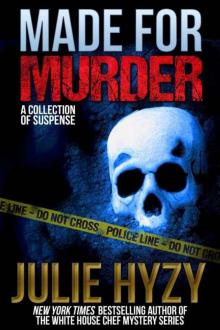 Made for Murder
Made for Murder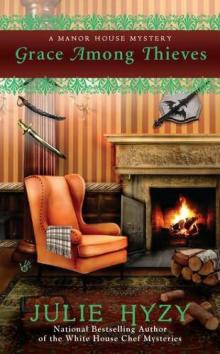 Grace Among Thieves
Grace Among Thieves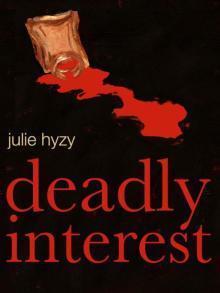 Deadly Interest
Deadly Interest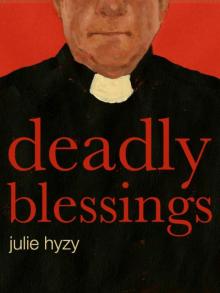 Deadly Blessings
Deadly Blessings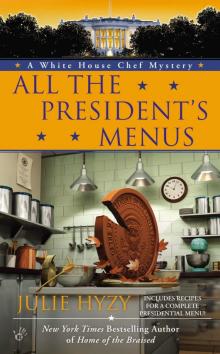 All the President’s Menus
All the President’s Menus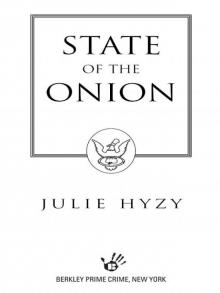 State of the Onion
State of the Onion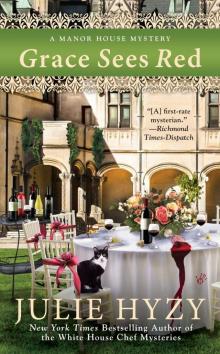 Grace Sees Red
Grace Sees Red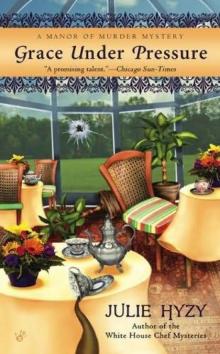 Whitehouse Chef 04 - Grace Under Pressure
Whitehouse Chef 04 - Grace Under Pressure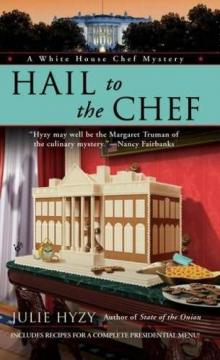 Hail to the Chef
Hail to the Chef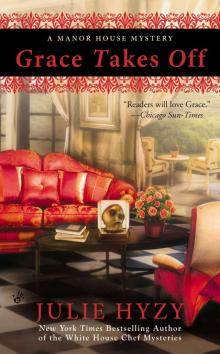 Grace Takes Off
Grace Takes Off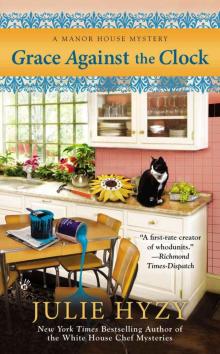 Grace Against the Clock (A Manor House Mystery)
Grace Against the Clock (A Manor House Mystery) Grace Cries Uncle
Grace Cries Uncle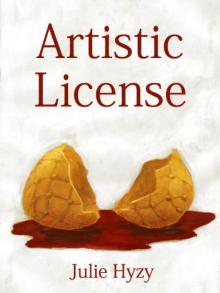 Artistic License
Artistic License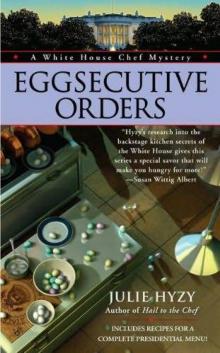 Eggsecutive Orders
Eggsecutive Orders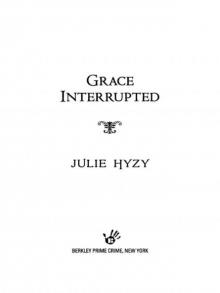 Grace Interrupted
Grace Interrupted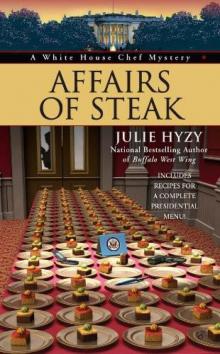 Affairs of Steak
Affairs of Steak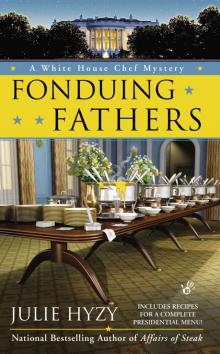 Fonduing Fathers
Fonduing Fathers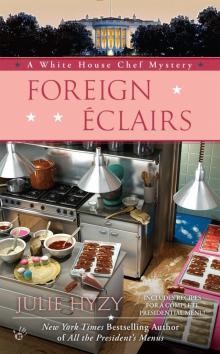 Foreign Éclairs
Foreign Éclairs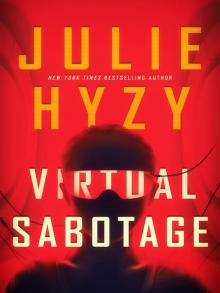 Virtual Sabotage
Virtual Sabotage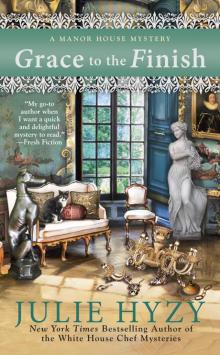 Grace to the Finish
Grace to the Finish